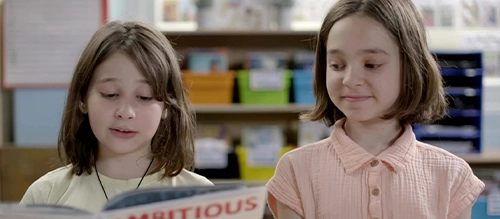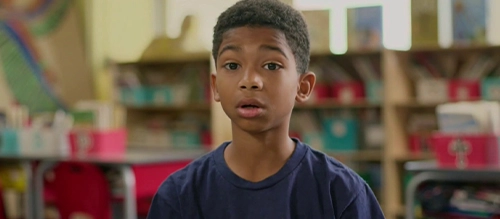The ABCs of Book Banning (2023) Short Film Review

The ABCs of Book Banning (2023)
Director: Sheila Nevins, Trish Adlesic, Nazenet Habtezghi
Children hold a wisdom not poisoned by the machinations of our adult world. They confront subjects simply, looking at them for what they are and what they mean to themselves and others, and form evaluations that don’t consider economics or politics, but simply basic human empathy. They ask, “what is most kind?”, and it’s amazing how often they’re right.
The ABCs of Book Banning is the 96th Academy Awards’ most moving and powerful Documentary Short Subject nominee. It opens with simple white text on a black screen that reads: “Over 2000 books have been removed from school districts in the United States. Those books have been labelled Restricted, Challenged, Banned and are generally not available to millions of students in up to 37 states.” Included in those 2000 books are “The Kite Runner”, “The Hobbit”, “The Handmaid’s Tale”, even “Anne Frank’s Diary“. “The voices of those who support book banning have been heard. This film features the voices of those who have not been heard… the children.”
The simplicity of the above statement outlines the absurdity of what is going on in the USA (and further afield), and highlights the disgusting ongoing politicisation of groups who have no say in the politics they are the subjects of. It is frankly shocking, astonishing, mind-melting, to have to confront the banning of books from schools in the year 2024, nevertheless literature like “Anne Frank’s Diary”. The children are flabbergasted, shocked, confused. Why would anyone do this? One 9-year-old named Yeye asks directly, “Why? Just why? Like, do you feel like Rosa Parks is a bad person?” The outright banning of Nikki Giovanni’s “Rosa” would suggest that some people do.
The film is framed around a speech made by 100-year-old Floridian, Grace Linn, at a Martin County School Board meeting. She walks up a long flight of stairs and unveils a quilt she made depicting banned books. She describes how her husband was killed during World War II, fighting for the United States’ constitutions and freedoms. “One of the freedoms that the Nazis crushed was the freedom to read the books they banned. They stopped the free press, banned and burned books. The freedom to read, which is protected by the first amendment, is our essential right and duty of our democracy. Even so, it is continually under attack by both the public and private groups. Banned books and burning books are the same. Both are done for the same reason: fear of knowledge. Fear is not freedom. Fear is not liberty. Fear is control. My husband died as a father of freedom. I am a mother of liberty. Banned books need to be proudly displayed and protected from school boards like this.”
Her words say it all.

The centenarian’s speech is rousing. And its power is used to emphasise the more basic points that the children who make up the film’s talking heads are presenting. One child asks how anyone is supposed to understand themselves or a loved one if they are unable to access the materials needed to do so, another very simply deconstructs the controversy surrounding a story of two male penguins nurturing an egg by saying “they’re still human beings, it’s not like they turned into werewolves or something.” It’s beautiful to see such pure thought and care and empathy seep out of these little people with big minds and the correct perspectives. “I like, also, learning about stuff so I can get smarter for every time, like, I need to know stuff”, one child so innocently claims. He’s right. That’s about as simple as it should be.
Among the banned books are all the stories you’d expect to be banned by an authoritarian regime like the Nazi Party of Germany. Almost exclusively, the stories are of fighting oppression, told from the perspectives of the oppressed. Anne Frank’s story is the most shocking, but there are restrictions or outright bans on books about black girls being strong in their convictions, about Muslim girls dealing with comments in social settings, about being a Jewish person in Nazi Germany, gay dads, trans teens, dancing drag queens. As the books are presented and a “banned” logo is stamped upon them, it gets only more shocking and devastating. Meena Harris’ “Ambitious Girl” is labelled “restricted” – “Limited access to the book, and in addition, parental consent required.” – but 9-year-old Nuli understands “it isn’t telling anybody to do anything bad, it’s just telling you to be who you are…”. 10-year-old Taylor hits the nail on the head when she adds, “If you read this book, and still after you read this book […] realise ‘oh this book needs to be banned’, then something is not clicking in your brain.”
These perspectives are the ones we must hold onto. How do so many people move so far away from such simple, humane, empathetic thoughts? These children are smarter and more human than any of the people imposing bans on the material they might one day read. In watching The ABCs of Book Banning, it is clear as day that the poison runs deep in our society, and that these children don’t deserve their dose.
This is a remarkable, unmissable documentary short.
Score: 24/24

